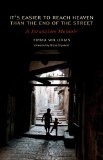Summary | Excerpt | Reviews | Beyond the Book | Readalikes | Genres & Themes | Author Bio

 Book Reviewed by:
Book Reviewed by:
Kim Kovacs
Buy This Book
We had no choice but to go back through the curfew, through
Bethlehem and out through yet another checkpoint.
Living in Jerusalem and working in the Occupied Territories
means that you see a great many soldiers. One afternoon the young
officer son of some Israeli friends sat down on the leather sofa in
his parents’ house and talked to me about working in the territories.
He was intelligent and thoughtful, sensitive and expressive,
speaking slowly with long pauses while he searched his mind. Every
word he said was weighed, not because he was afraid of saying the
wrong thing to me — an outsider, a goy — but because he was
working out what it meant to him. He was working out how it
was that he had ended up doing the things he didn’t want to tell
me about.
He was not the sort of soldier who would swing open the door
of his jeep and rake bullets into a house under curfew, killing a
woman on her porch in the process (the mother of one of our
friends died in this way). But he had had to do things that he
found unacceptable and had ended up asking for a transfer.
Perhaps he was seeking control over his actions; perhaps he just
wanted to escape. It wasn’t his fault that he’d had to do terrible
things to defend his country. But that was the nub of what he was
trying to sort out in his head.
He talked of the need to sustain military order—“if that goes,
then you’re really in trouble”—and his understanding of “what the
reality means,” the reality of why they were there in the first place.
“All that the Palestinians wanted was to get to their fields or to
the house to see Grandma, but we were trained to think of them
as the enemy. That everyone is a potential saboteur.” Some of the
officers were more aggressive and let the troops have their head.
“Oh, they all emphasize the need to be polite,” he said. “But many
of them are looking for a fight. It’s boring. They’re soldiers. The
same Palestinians come back again and again, saying they want to
get to their fields—or to Grandma’s house—and you’ve sent them
back an hour ago, and yesterday, twice, and you have to send them
back again—but our orders are to keep them away from the
settlers. That’s our job, you see.”
Soldiers contend with villagers sitting in front of army bulldozers,
begging them not to demolish their houses or their orchards;
with Palestinian farmers who want to harvest the olives from their
trees; and with Jewish settlers who tell the soldiers this land was
given to them by God 3,000 years ago and who are you to stand
in our way when we drive off the Palestinians and take the olives?
They are our olives: God gave them to us. And the Palestinians are
pleading—our grandfathers planted these trees, please, protect us
from the settlers. Then the Israeli peace activists try to intervene
and say that the law we follow is man’s law and if we follow God’s
law we’ll be stoning each other for our transgressions, for God’s
sake. And the children come back from school and are trying to get
to the village to do their homework and the settlers attack them
with dogs and chains because this is our land, God gave it to us,
and the Israeli peace activists say again, what kind of Israel do you
want? And there they are, the soldiers, stuck in the middle,
trapped.
And they know that anyone approaching them might be
strapped with explosives and ready to die.
Some deal with their fears by thinking they no longer care
about anything, wearing apathy like a shield. In Hebron a soldier
shot the legs off two kids but, he said, nothing bad happened to
him, it didn’t affect him. Another said shooting was the “IDF
soldier’s way of meditating. It’s like shooting is your way of letting
go of all your anger when you’re in the army.”There’s also “punitive
shooting”—opening fire on whatever you like: on windows with
washing hanging up to dry, knowing there were people who would
be hit. But the shield confuses the soldiers when they get home
because the violence must not follow them; they must leave it
somewhere, and that isn’t always easy.There’s no room in Israeli life
for firing on children, for example: that couldn’t be real, could it?
Surely that doesn’t happen. Israelis talk about the bubble—the
place where what goes on in the Occupied Territories can’t touch
them. It is a place to hide.
Excerpted from It's Easier to Reach Heaven Than the End of the Street by Emma Williams. Copyright © 2009 by Emma Williams. Excerpted by permission of Interlink Books. All rights reserved. No part of this excerpt may be reproduced or reprinted without permission in writing from the publisher.





The Funeral Cryer by Wenyan Lu
Debut novelist Wenyan Lu brings us this witty yet profound story about one woman's midlife reawakening in contemporary rural China.
Your guide toexceptional books
BookBrowse seeks out and recommends the best in contemporary fiction and nonfiction—books that not only engage and entertain but also deepen our understanding of ourselves and the world around us.